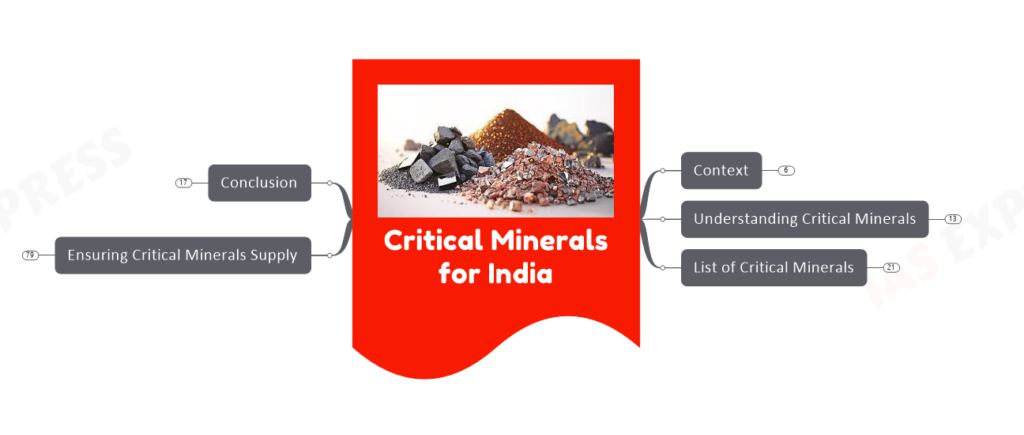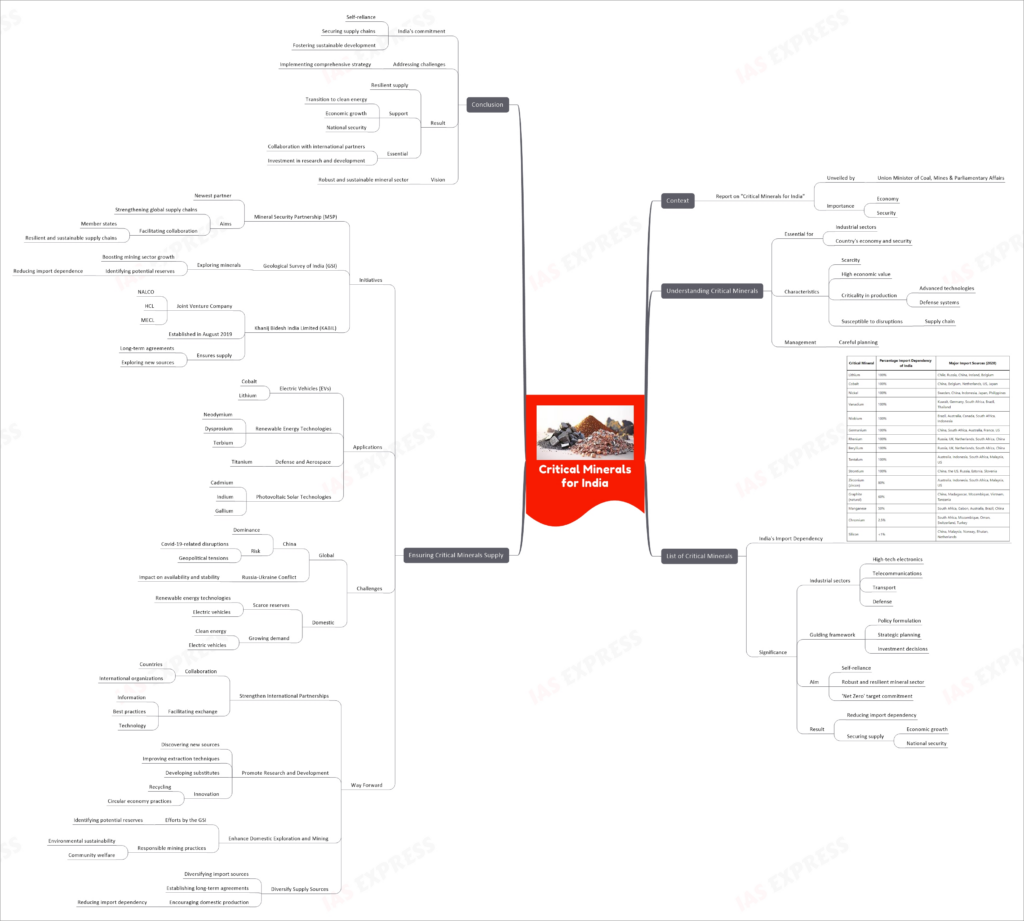Critical Minerals for India: Ensuring Supply Security and Sustainable Development

In a significant move, the Union Minister of Coal, Mines & Parliamentary Affairs recently unveiled the first-ever report on “Critical Minerals for India.” This report, prepared by an expert team constituted by the Ministry of Mines, highlights the importance of critical minerals for the country’s economy and security.
In this comprehensive article, we will delve into the concept of critical minerals, examine India’s import dependency, discuss the significance of the Critical Minerals List, and explore the initiatives taken by India to ensure a resilient supply chain. Additionally, we will address the challenges faced by India in this domain and the way forward towards achieving supply security and sustainable development.
This topic of “Critical Minerals for India: Ensuring Supply Security and Sustainable Development” is important from the perspective of the UPSC IAS Examination, which falls under General Studies Portion.
Understanding Critical Minerals
Critical minerals are a group of minerals that are essential for various industrial sectors and hold strategic importance for a country’s economy and security. These minerals possess certain characteristics such as scarcity, high economic value, and criticality in the production of advanced technologies and defense systems. The scarcity and complex value chains associated with critical minerals make them susceptible to supply chain disruptions, necessitating careful planning and management.
List of Critical Minerals and India’s Import Dependency
| Critical Mineral | Percentage Import Dependency of India | Major Import Sources (2020) |
|---|---|---|
| Lithium | 100% | Chile, Russia, China, Ireland, Belgium |
| Cobalt | 100% | China, Belgium, Netherlands, US, Japan |
| Nickel | 100% | Sweden, China, Indonesia, Japan, Philippines |
| Vanadium | 100% | Kuwait, Germany, South Africa, Brazil, Thailand |
| Niobium | 100% | Brazil, Australia, Canada, South Africa, Indonesia |
| Germanium | 100% | China, South Africa, Australia, France, US |
| Rhenium | 100% | Russia, UK, Netherlands, South Africa, China |
| Beryllium | 100% | Russia, UK, Netherlands, South Africa, China |
| Tantalum | 100% | Australia, Indonesia, South Africa, Malaysia, US |
| Strontium | 100% | China, the US, Russia, Estonia, Slovenia |
| Zirconium (zircon) | 80% | Australia, Indonesia, South Africa, Malaysia, US |
| Graphite (natural) | 60% | China, Madagascar, Mozambique, Vietnam, Tanzania |
| Manganese | 50% | South Africa, Gabon, Australia, Brazil, China |
| Chromium | 2.5% | South Africa, Mozambique, Oman, Switzerland, Turkey |
| Silicon | <1% | China, Malaysia, Norway, Bhutan, Netherlands |
Significance of the Critical Minerals List
The Critical Minerals List holds immense significance for India’s industrial sectors, particularly high-tech electronics, telecommunications, transport, and defense. It serves as a guiding framework for policy formulation, strategic planning, and investment decisions in the mining sector. By identifying and prioritizing critical minerals, India aims to achieve self-reliance, foster a robust and resilient mineral sector, and align with its commitment to achieving a ‘Net Zero’ target. This comprehensive approach will enable India to reduce its dependence on imports and secure the supply of critical minerals crucial for its economic growth and national security.
Initiatives for Ensuring Critical Minerals Supply
India has undertaken several initiatives to ensure a resilient supply chain for critical minerals:
- Mineral Security Partnership (MSP):
- India recently joined the Mineral Security Partnership as the newest partner.
- A strategic grouping of 13 member states, including the United States, Australia, Canada, and the European Union.
- MSP aims to strengthen critical mineral supply chains globally.
- It facilitates collaboration among member states for the development of resilient and sustainable supply chains.
- Geological Survey of India (GSI):
- The GSI is actively engaged in exploring critical and deep-seated minerals to boost the growth of the mining sector.
- This exploration helps in identifying potential mineral reserves within the country, reducing import dependence.
- Khanij Bidesh India Limited (KABIL):
- KABIL is a Joint Venture Company among NALCO, HCL, and MECL formed in August 2019.
- It ensures the supply of critical minerals by securing long-term agreements and exploring new sources.
Applications and Importance of Critical Minerals
Critical minerals find extensive applications in various industries, contributing to the development of advanced technologies. Here are some key applications of critical minerals:
| Application | Critical Minerals |
|---|---|
| Electric Vehicles (EVs) | Cobalt, lithium |
| Renewable Energy Technologies | Neodymium, dysprosium, terbium |
| Defense and Aerospace | Titanium |
| Photovoltaic Solar Technologies | Cadmium, indium, gallium |
Challenges in Ensuring Critical Minerals Supply
India faces various challenges, both domestic and international, in assuring resilient critical minerals supply chains. Some of the major challenges include:
- Global Challenges:
- China: China’s dominance in critical mineral supply chains poses a risk due to factors like Covid-19-related disruptions and geopolitical tensions.
- Russia-Ukraine Conflict: The ongoing conflict between Russia and Ukraine has implications for critical mineral supply chains, impacting availability and stability.
- Domestic Challenges:
- Scarce Reserves: India lacks significant reserves of minerals required for renewable energy technologies and electric vehicles.
- Growing Demand: The transition to clean energy and electric vehicles leads to an increased demand for critical minerals, exacerbating import dependence.
Way Forward: Ensuring Supply Security and Sustainable Development
To address the challenges and achieve supply security for critical minerals, India needs to adopt a comprehensive approach:
- Strengthen International Partnerships:
- Collaborate with countries and international organizations through forums like the Mineral Security Partnership (MSP) and G7’s Sustainable Critical Minerals Alliance.
- Facilitate the exchange of information, best practices, and technology for sustainable mining and mineral processing.
- Promote Research and Development:
- Invest in research and development to discover new sources, improve extraction techniques, and develop substitutes for critical minerals.
- Encourage innovation in recycling and circular economy practices to minimize waste and enhance resource efficiency.
- Enhance Domestic Exploration and Mining:
- Continue efforts by the Geological Survey of India (GSI) to identify and evaluate potential mineral reserves within the country.
- Promote responsible mining practices that prioritize environmental sustainability and community welfare.
- Diversify Supply Sources:
- Reduce dependence on a single country or region by diversifying import sources and establishing long-term agreements with reliable partners.
- Encourage domestic production and value addition to reduce import dependency.
Conclusion
The Critical Minerals List and India’s initiatives reflect the country’s commitment to achieving self-reliance, securing supply chains, and fostering sustainable development. By addressing the challenges and implementing a comprehensive strategy, India can ensure a resilient supply of critical minerals, support the transition to clean energy, and bolster its economic growth and national security. Collaboration with international partners and investment in research and development are essential for realizing India’s vision of a robust and sustainable mineral sector.


